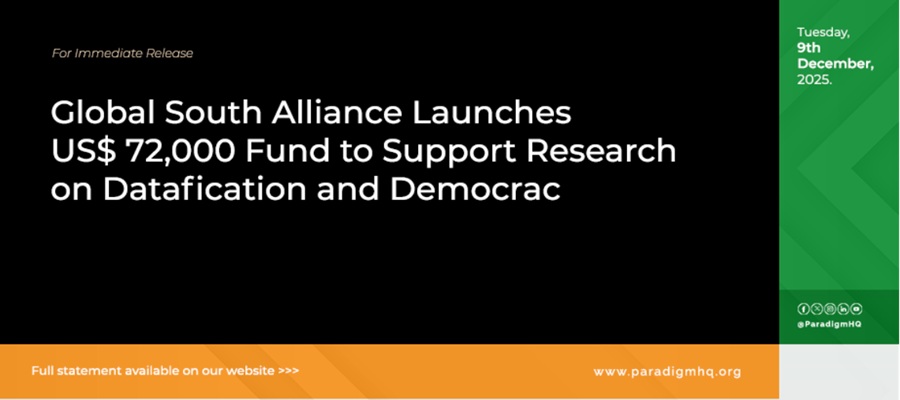Broadcasting
The Silent Killer of Great Companies: A Guide To Why Your Processes Will Break (and How to Fix Them)

By Tolulope Obianwu
Every high-growth company experiences a moment when its engine sputters—quietly at first. Emails slip through cracks, customers wait too long, and once-smooth systems start breaking under pressure. This rarely looks like failure; it feels like chaos.

Tolu Obianwu
The truth? Your team didn’t fail. Your process did.
More accurately, the process you never designed to scale.
I’ve led operations and strategy at some of Africa’s fastest-growing fintech companies, building teams and systems that power complex payment infrastructure. And I’ve seen it repeatedly: velocity hides inefficiency—until it doesn’t.
This isn’t just a fintech problem. It’s a scaling problem. And if you’re a founder, operator, or builder, this article is your early warning: poor process doesn’t announce itself. It accumulates, silently, until your best people are fighting fires they didn’t start.
So, before things break, let’s talk about what makes processes fail, and what it takes to build operational structures that scale with your ambition.
DO NOT Confuse Speed with System: Startups are built on hustle. That’s part of the magic. But hustle without design leads to fragile outcomes. What works when you’re a 5-person team becomes a burden when you’re 50. Manually sorting payments, ad-hoc decisions, Slack approvals; these shortcuts become operational debt.
DO THIS INSTEAD:
Build systems early. They don’t have to be perfect, but they must be repeatable. Even lightweight process maps give your team breathing room and build investor confidence.
DO NOT Build Around Individuals: We romanticise “indispensable” team members; the only person who knows how X works. But hero-driven execution is unsustainable. When your process depends on one person being online, awake, or available, you’re not building a company. You’re gambling on burnout.
DO THIS INSTEAD:
Document workflows, spread context, and make knowledge transfer part of your onboarding and offboarding. Structure should outlive talent.
DO NOT Mistake Micromanagement for Control: I’ve seen it too often: leaders respond by inserting themselves into every decision when processes start breaking down. It’s understandable, but counterproductive. Micromanagement is not a fix. It’s a symptom.
DO THIS INSTEAD:
Create trust frameworks. Use process audits, not pressure. Empower teams with clear guardrails, not constant approvals. The goal of an exemplary process isn’t control – it’s clarity.
DO NOT Design for the Happy Path Only: Most processes look beautiful on paper until real users, real edge cases, and real stress tests come in. If your refund process fails when the volume spikes or your reconciliation breaks on public holidays, that’s not a people problem. It’s a design flaw.
DO THIS INSTEAD:
Anticipate failure. Ask “What could go wrong?” Run simulations. Processes must bend without breaking. That’s true resilience.
DO NOT ignore the Role of Culture: Even the best-designed processes die in hostile environments. If your culture rewards shortcuts, ignores documentation, or treats processes as bureaucracy, nothing will stick.
DO THIS INSTEAD:
Make ‘process’ a language, not a punishment. Celebrate people who fix broken steps. Tie operational excellence to career growth. Culture is what makes a process sustainable.
DO NOT Launch Processes Without Data Loops: If you’re not tracking turnaround times, errors, or usage, you’re not managing a process; you’re just hoping it works.
DO THIS INSTEAD:
Instrument every stage. Set KPIs that matter. Let data flag inefficiencies before customers feel them. A great process isn’t just followed – it’s monitored.
Final Thoughts
The truth is: every fast-growing company outgrows its old ways of doing things. There comes a time when velocity alone can’t carry the vision anymore. That’s inevitable. What isn’t inevitable is being caught off guard when it happens.
If you’re building for scale, process isn’t a bottleneck; it’s your runway. The best systems don’t slow people down; they let good teams move faster, with clarity and confidence.
Don’t wait for failure to expose what structure could have prevented it. Build deliberately. Review often. Automate what you can. And above all, make sure your process is strong enough to carry the weight of your ambition.
Because in the long run, it’s not speed that wins.
It’s the ability to move fast, without breaking yourself.
Tolulope Obianwu is a highly experienced professional in operations and technology strategy and currently is Head, Core Operations at TeamApt Ltd
Broadcasting
Global South Alliance Launches $72,000 Datafication and Democracy Fund to Support 2026 Research Projects

The Global South Alliance, a coalition of 26 digital rights organizations, launched today the second edition of the “Datafication and Democracy Fund” on December 9.

Global South Alliance
The Fund will provide more US$ 72,000 to support research and advocacy projects focused on datafication and democracy to be implemented in 2026.
The Datafication and Democracy Fund was launched during the fourth edition of the Data Privacy Global Conference, organized in São Paulo, Brazil. The Global South Alliance is jointly managed by Data Privacy Brasil, Aapti Institute, and Paradigm Initiative.
The members are Asociación por los Derechos Civiles, Bolo Bhi, Center for Communication and Governance, CIPESA, Derechos Digitales, Digital Rights Foundation, Dukingire Isi Yacu, Internet Bolivia, Pollicy, Research ICT Africa, Fundación Multitudes, InternetLab, Thraets, Jokkolabs Banjul, Aláfia Lab, Centre for Policy Alternatives, KICTANET, Tech Global Institute, Freedom Forum, TEDIC, Digital Access, Center for AI and Tech Innovation for Democracy and Masaar.
The call for proposals is open to non-profit, non-governmental organizations based in the Global South working on digital rights and related public policy issues. Previously supported organizations have addressed topics such as online child protection, data governance in electoral processes, biometric technologies in stadiums and large events, mandatory biometric data collection of migrants, and discriminatory surveillance and datafication practices.
According to the launch announcement, the Datafication and Democracy Fund “aims to finance research and public policy analysis projects that address critical questions arising from the impact of datafication on democracy.” The Alliance emphasizes that “datafication is a deep and complex process of social transformation: it shapes the provision of public services mediated by information technologies, the emergence of digital public infrastructures, the data-driven nature of elections, the reconfiguration of markets and platforms, and many aspects of civic life. Beyond deliberative processes and elections, datafication exacerbates democratic challenges such as transparency, due process, and respect for citizens’ autonomy.”
Selected applicants will receive grants of up to US$ 8,000 to support their research projects. Depending on the proposals submitted, between 8 and 12 projects will be funded. All funded projects must be carried out during 2026.
Applicants are required to submit:
A one-page cover letter outlining the organization’s background, experience, and motivation for participating in the research program;
A proposal of up to five pages detailing the topic, scope, methodology, expected results, and relevance of the project to digital rights and democracy in the Global South;
A detailed budget, not exceeding US$ 8,000, specifying how resources will be allocated across the proposed project’s components.
Applications must be submitted in English by January 30th 2026, through the designated online form.
Broadcasting
End of an Era as Multichoice Delists from JSE After Canal+ Takeover

South Africa’s leading pay-TV operator, Multichoice, owner of DStv and Showmax, will officially delist from the Johannesburg Stock Exchange (JSE) this week following its acquisition by French media giant Canal+.

DStv
The delisting, scheduled to take effect on Wednesday, Dec. 10, 2025, also applies to Multichoice’s ordinary shares on the A2X Markets.
The move comes after Canal+ completed a Squeeze-Out of remaining shareholders, securing full ownership of the company after nearly two years of acquisition efforts.
According to the company, the delisting remains subject to regulatory approvals from the JSE, the A2X, and the South African Reserve Bank. Canal+ has pledged to comply with conditions set by South Africa’s competition authorities and intends to proceed with a secondary inward listing on the JSE within nine months of the delisting.
Founded in 1985 with the launch of M-Net, Multichoice has been a household name across Africa for four decades. It introduced DStv in 1995, expanded into multiple African markets, and launched its streaming platform, Showmax, in 2015.
In 2019, Multichoice was spun out of Naspers, South Africa’s most valuable company, and later began secondary trading on A2X in 2020.
The acquisition by Canal+ marks a significant shift in South Africa’s media landscape. Local investors will no longer be able to hold direct stakes in Multichoice, but will only gain indirect exposure once Canal+ completes its planned inward listing.
Industry analysts say the takeover underscores the growing consolidation in global media markets, with Canal+ strengthening its footprint across Africa through Multichoice’s extensive subscriber base and sports broadcasting rights via Supersport.
Broadcasting
How Nigerian Companies are Leading a More Responsible Digital Transformation

By Kehinde Ogundare, Country Head, Zoho Nigeria
Artificial intelligence is everywhere–in polished social media posts, in the recommendations that guide our viewing habits, and in the bots that handle customer queries before a human agent steps in. On LinkedIn, AI-assisted writing has become standard practice. A year ago, more than half of English long-form posts that went viral were estimated to have been written by or assisted by AI. If that’s the norm on the world’s biggest business network, it’s no surprise that AI is driving conversations in Nigerian boardrooms as companies move from experimentation to embedding AI into their daily operations.

Kehinde Ogundare, Country Head, Zoho Nigeria
Part of the package
The Nigeria Data Protection Act (NDPA), modelled on the European Union’s General Data Protection Regulation, together with the Nigeria Data Protection Commission, requires companies to build privacy into their systems from the outset rather than adding it later. This clear regulatory framework has evolved alongside a rapid rise in AI adoption.
New research from Zoho on responsible AI adoption highlights the impact of the regulations. As per the report, 93% of Nigerian companies have already started using AI in their daily operations; 84% have tightened their privacy controls after adoption, and 94% now have a dedicated privacy officer or team, which is well above global averages.
The survey, conducted by Arion Research LLC among 386 senior executives, shows just how deeply embedded AI has become in Nigeria. One in four companies already uses it across several departments, and nearly a third report advanced integration. Financial services firms are pioneers in this sector, using AI to automate client interactions, streamline operations and sharpen their marketing, while staying compliant with data protection rules.
The NDPA has helped make privacy part of business planning. Four in ten companies now spend more than 30% of their IT budgets on privacy. Regular audits, privacy impact assessments and explainability checks are becoming standard practice.
Skills, compliance and capacity
Rapid adoption brings challenges. More than a third of businesses say that their biggest obstacle is a lack of technical skills, and another 35% cite privacy and security risks. Instead of outsourcing, most are building capacity in-house: nearly 70% of companies are training staff in data analysis, more than half are improving general AI literacy, and 40% are investing in prompt engineering for generative tools.
The understanding of the NDPA regulation, which came into force in 2023, has also improved. 65% of organisations see compliance as essential. Many voluntarily apply data-minimisation and transparency standards even when not required to do so, aligning more closely with international norms and easing collaboration with global partners.
Privacy is increasingly influencing business decisions — from investment priorities to system design. Companies are asking tougher questions: is specific data essential? How can exposure be limited? How can fairness and transparency be proven?
Trusted systems
As privacy becomes part of how technology is built, companies are being more cautious about the tools they use because they now want systems that protect customer data, with clear boundaries between data and model training, straightforward controls, and reliable records for compliance teams.
Demand for business software that balances productivity with privacy is also growing. Zoho, among others, has seen strong customer growth as more organisations are looking for platforms that support responsible data handling.
The study identifies three main reasons behind AI adoption: to make work more efficient by automating routine tasks, to support better decision-making by identifying patterns sooner, and to improve customer engagement through faster, more relevant interactions. But none of this can succeed without trust. Nigeria’s experience shows that privacy and innovation can reinforce each other when they’re built together.
There’s still work to do because some industries are moving faster than others, and smaller businesses often face the biggest hurdles in time, cost and skills. Enforcement is also patchy; while the law is clear, application across sectors and geographies is a work in progress.
The next steps are more practical, requiring investment in skills – from data analysis and AI literacy to sector-specific training – and for governance to be put in place, with clear responsibilities, written policies, and a plan for managing errors or breaches. Privacy impact assessments should become part of every new system rollout, enabled by technology.
As AI becomes fundamental to doing business, Nigerian companies that build it carefully and responsibly will be better able to compete at home and abroad.

 General News2 days ago
General News2 days agoNiDCOM Launches Diaspora Startup Challenge to Boost Nigerian Talent

 News2 days ago
News2 days agoLagos Launches Tele-Vet, Nigeria’s First Veterinary Call Centre

 E-Financial2 days ago
E-Financial2 days agoCAC to Shut Down Unregistered PoS Operators by January 2026

 Telecom2 days ago
Telecom2 days agoNigeria Lacks AI-Ready Data Centres, Trails in Capacity – Nnamani

 Telecom2 days ago
Telecom2 days agoAnambra Leads Southeast in Digital Governance Under Soludo’s ICT Agenda

 General News2 days ago
General News2 days agoOptimus AI LABS CEO Showcases AI Breakthroughs in Nigeria’s Financial Sector

 General News2 days ago
General News2 days agoPromoPrint Rekindles Nigerian Resilience @ 25th Anniversary

 Telecom1 day ago
Telecom1 day agoNigeria Dominates 2025 TikTok Sub-Saharan Africa Awards with Six Wins
















